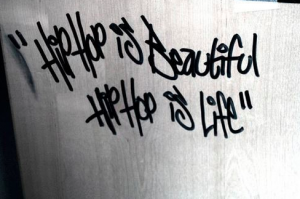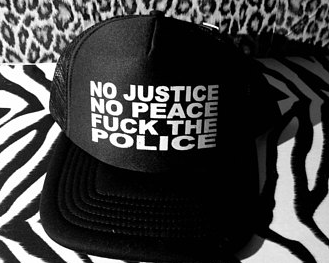In my mind it is the bridge between the unspoken and white picket fences. We’re talking as gutta as Wu-Tang Clang, as authentic as The Roots, as everlasting as Pac and Biggie, and as pivotal as Shawn Carter; there is a reason this black noise was bursting through Jordan Davis’ red dodge Durango. I believe the misinterpretation and seemingly irritable nature of black noise served as a death sentence for Davis; but unfamiliarity is always the archenemies of privilege.
What black noise is, is a lifeline for pain and questionability. These are real voices that convey the everyday lives, perceptions, and inevitable truths of one of American’s third worlds. Reality defines the state of things in which they exist. To be blinded by such, can be defined as privilege.
Early black “noise” was the inspiration behind a once billion-dollar Black Entertainment Television network. It is more than noise. It is kin to the triangular trade that birthed this discarded third world nation. Though this vibration driven tale dates back to the tumultuous 70’s, it is its 90’s alliances that put these voices on the map. Hip-hop deserves its own Mount Rushmore up on Sedgwick Ave in the Bronx.
It didn’t surprise me in 2018 when I was tackling Tricia Rose’s critical analysis Black Noise, when she revealed an encounter with a colleague after which she had presented some research on this thing we call hip-hop. For the same reason it served as a death sentence for Davis, it served as a simple “nothing” to Roses’ colleague, the same nothing Jordan Davis’ privileged predator left him to descend into. In chapter three of the 1994 publication, Rose recalls hip-hop’s misinterpretator as stating, “Well, you must be writing on rap’s social impact and political lyrics, because there is nothing to the music.” (62)
“They ride down the street at 2:00 am with it blasting from car speakers, and (they) wake up my wife and kids. What’s the point in that?” Rose further recalls. (62)
As a self-proclaimed hip-hop baby I know how it makes me feel to ride with reasonable doubt blasting through the highest volume of my Civic. I am relating. I am feeling. I am understanding. Obliviously, I am dreaming. Can I live, in imagination that life has something more for me than it did my mother? Can I live, feeling in empathy for the black men whose public school systems don’t believe in anything more than their ability to be a drug dealing or dead ridden statistic? Can I live, with the least bit of comfort knowing somebody out there knows my story? And cares too.
Those political lyrics are as acquainted with Keisha down the block as the star spangle banner is to American stadiums.
Hip-hop’s coded language is the underground railroad that for once, refuses to cross its legs in favor of lady-likeness. Hip-hop lets the truth hang, something political correctness has never done. Hip-hop is a gift only received by those rich enough to understand our value.
As real as it gets, hip-hop tells the 1991 story of the 12-year-old Brooklyn girl that threw her baby down a chute and into a trash compactor. That’s “Brenda’s got a baby.” For those who have consistently lived behind white picket fences, the traumatization of third world tendencies are imaginable. I’m talking Margaret Garner and Beloved feels. I’m talking “the damage is irreversible” pull the plug type of feels.
“Can I live” speaks the inevitable consequences of the the Cross-Bronx Expressway and the ways in which something as politically correct as gentrification leaves third world residents to by any means necessary, make things happen for themselves.
This revelation that rap is mere noise is a reflection of the heart and eyes in which our melanin has always been regarded. For my fellow hip-hop babies, welfare recipients, affirmative actions beneficiaries, and driving while black inheritors, this revelation of meaningless noise is as Jim Crow as it gets.
Hip-hop is perfectly imperfect in the sense that it accurately lets the rest of the world know of the unprosperous cards black people have been (and are being) dealt.
For a moment, I will entertain the foulness of NWA’s “Fuck The Police” era that often ends up being the burden of proof that rap is merely a loud, violent, and unnecessary hobby. If “affluenza” is legit, so is “Fuck The Police.”
Why is it that affluenza [i] can get a wealthy white teenager out of drunk driving and killing four people yet a black man cannot utter a cultural expression to his oppressor?
It is unfair to hold one to a standard of moral and political correctness, while the other through the lens of superiority. Two wrongs don’t make a right but they do enforce a pattern. Expecting black men who have lived their entire lives under racial and social inequality to suddenly take the “high road” when you have yet produced them with some sort of ladder to equity is incomprehensible to say the least.
America’s law enforcement system was founded through the same moral and politically incorrect systems that make black bodies “less than” and a target for unjust treatment. The only time a black body is held in high regards is when it opposes its oppressor. It is then that the 3/5th compromise never existed.
“Fuck The Police” is a black man’s back against the wall (literally) and his only way out is to fight the thing that put him there. Hip-hop is not guilty of creating detrimental social impacts. In order for something to not be innocent it has to be the perpetrator of wrongdoing or crime. Verbal expression over banging beats regarding 1990s crown heights or 1990s Compton is as virtuous as we know.
Yes, hip-hop is noise. Voices are noise. And voices are quintessential to this thing we call life.
Hip-hop is necessarily unapologetic, too, a result of morally incorrect ideology this country stands on. Hip-hop’s critics may never acknowledge the role black coded laws played in putting black expression on the map.
I recently encountered a 23-year-old Chinese woman who has been a U.S resident for just 6 years. She began to speak to me regarding the interesting American things she’s encountered; a colleague had just given her an introduction to rap. Stunned, I immediately asked if hip-hops controversial lyrics interfered with her ability to enjoy it. Her response, and I quote “Not at all. It is part of the culture.”
In 5 years of American culture and 1 brief lesson on hip-hop, this China native who was still grasping English orality understood this black expressiveness. I stand strong when I say, black noise is consistently and inaccurately regarded as “nothing” due to its close resemblance to black life. Hip-hop’s acceptance as legit art is parallel to white Americans acceptance of black Americans, and the removal of the veil in which black Americans have always been hidden under.
Footnote
[i] Affluenza- a psychological malaise supposedly affecting wealthy young people, symptoms of which include a lack of motivation, feelings of guilt, and a sense of isolation. See https://en.wikipedia.org/wiki/Ethan_Couch
Work Cited
Rose, Tricia. (1994). Black noise : rap music and black culture in contemporary America. Hanover, NH :University Press of New England.


